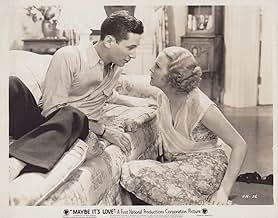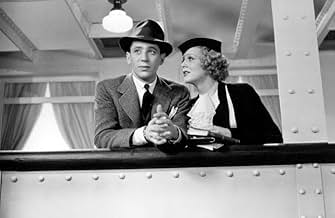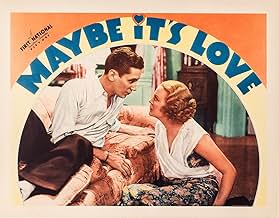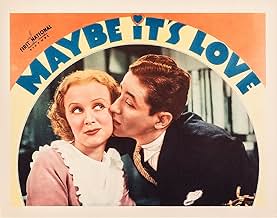Agrega una trama en tu idiomaA young couple in love who face economic woes once they're wed.A young couple in love who face economic woes once they're wed.A young couple in love who face economic woes once they're wed.
- Dirección
- Guionistas
- Elenco
Arthur Aylesworth
- Diner
- (sin créditos)
Eddy Chandler
- Motor Cop Driver
- (sin créditos)
Heinie Conklin
- Second Complaining Husband
- (sin créditos)
Billy Dooley
- Louie - the Counterman
- (sin créditos)
Betty Farrington
- Second Complaining Wife
- (sin créditos)
Paul Hurst
- Expressman
- (sin créditos)
Opiniones destacadas
Maybe It's Love (1935)
** 1/2 (out of 4)
Predictable but amusing romantic comedy from Warner has Gloria Stuart (The Invisible Man) playing a secretary who is waiting for the man she loves (Ross Alexander) to marry her but she must use another man to make him jealous. After they're finally married, both realize that the married life is harder than they thought. The story here certainly isn't anything new but the glowing charm of Stuart really makes this film a lot better than the script deserved. There's also some great character actors who add wonderful support and they include Cagney's buddy Frank McHugh as the brother-in-law, Henry Travers as the father and Ruth Donnelly as the sister. All three add some nice laughs to the film with McHugh stealing the film as the dimwitted sap. There are a couple problems with the film and one of them is Alexander who just isn't charming enough for the role. Another problem is that the film runs 63-minutes, which is too short because it leads to a major plot gap towards the end of the film. One scene the couple is happily married and then out of no where they are fighting and breaking up. This film certainly isn't a classic but if you're a fan of any of the actors then it's worth viewing once.
** 1/2 (out of 4)
Predictable but amusing romantic comedy from Warner has Gloria Stuart (The Invisible Man) playing a secretary who is waiting for the man she loves (Ross Alexander) to marry her but she must use another man to make him jealous. After they're finally married, both realize that the married life is harder than they thought. The story here certainly isn't anything new but the glowing charm of Stuart really makes this film a lot better than the script deserved. There's also some great character actors who add wonderful support and they include Cagney's buddy Frank McHugh as the brother-in-law, Henry Travers as the father and Ruth Donnelly as the sister. All three add some nice laughs to the film with McHugh stealing the film as the dimwitted sap. There are a couple problems with the film and one of them is Alexander who just isn't charming enough for the role. Another problem is that the film runs 63-minutes, which is too short because it leads to a major plot gap towards the end of the film. One scene the couple is happily married and then out of no where they are fighting and breaking up. This film certainly isn't a classic but if you're a fan of any of the actors then it's worth viewing once.
Maxwell Anderson's very popular 1927 play, with 3 television productions as well as the three movies versions, has some very funny moments. The top-notch cast has Gloria Stuart, of Titanic (1996) fame, and Ross Alexander as the romantic leads in a seesaw romance. The highlight of the movie is the way Stuart gets Alexander to marry her, as coached by big sister Ruth Donnelly, who supplies cues in shorthand, and accurately predicts Alexander's responses to Stuart's actions and statements. I couldn't stop laughing at the entire sequence, even though I had seen the remake, Saturday's Children (1940). Unfortunately, the second half of the movie doesn't sustain the comedy of the first half, and degenerates into more of a drama about the difficulties in marriage. Still, the movie is a winner.
One would never suspect that this little domestic comedy comes from the pen of Maxwell Anderson, since it's no more than a typical piece of Depression-era fluff about money and finances being the root of most domestic squabbles.
Lovely GLORIA STUART (so beautiful in her prime) and ungainly ROSS Alexander (he never made it to stardom) are the leads and the supporting cast is a pleasant one filled with Warner contract players. But it's PHILLIP REED, as a rich man's playboy son, who should have had the romantic lead opposite Stuart, looking like a Tyrone Power clone, and not a bad actor at all.
HENRY TRAVERS, RUTH DONNELLY, FRANK McHUGH and others are well used, with McHugh being much less obnoxious than usual in his more subdued comedy role as Donnelly's husband.
It starts out briskly, with a lot of talk about "the situation in Europe" and "how Europe is making out" as part of the breakfast talk, so it seems that it's going to be a better than usual domestic tale that raises some serious issues. But before it's midway through, it gets stuck in a rut as no more than an office romance that ends in marriage but quickly falls into silly lover's spats and quarrels over finances and the inability to "live on a budget".
From that midway point on, it descends into a trivial domestic comedy with pat situations complete with a cornball ending that reunites the lovers under trying circumstances.
Summing up: Not worth the trouble. I note from another comment that this became a remake called "Saturday's Children" in the '40s with John Garfield, Ann Shirley and Claude Rains.
Trivia note: Ross Alexander was an up and coming Warner contract player who appeared the same year in "A Midsummer Night's Dream" and "Captain Blood" and was being considered for bigger roles, but he committed suicide two years later over problems with his marriage and rumors of his homosexuality which the studio tried to suppress.
Lovely GLORIA STUART (so beautiful in her prime) and ungainly ROSS Alexander (he never made it to stardom) are the leads and the supporting cast is a pleasant one filled with Warner contract players. But it's PHILLIP REED, as a rich man's playboy son, who should have had the romantic lead opposite Stuart, looking like a Tyrone Power clone, and not a bad actor at all.
HENRY TRAVERS, RUTH DONNELLY, FRANK McHUGH and others are well used, with McHugh being much less obnoxious than usual in his more subdued comedy role as Donnelly's husband.
It starts out briskly, with a lot of talk about "the situation in Europe" and "how Europe is making out" as part of the breakfast talk, so it seems that it's going to be a better than usual domestic tale that raises some serious issues. But before it's midway through, it gets stuck in a rut as no more than an office romance that ends in marriage but quickly falls into silly lover's spats and quarrels over finances and the inability to "live on a budget".
From that midway point on, it descends into a trivial domestic comedy with pat situations complete with a cornball ending that reunites the lovers under trying circumstances.
Summing up: Not worth the trouble. I note from another comment that this became a remake called "Saturday's Children" in the '40s with John Garfield, Ann Shirley and Claude Rains.
Trivia note: Ross Alexander was an up and coming Warner contract player who appeared the same year in "A Midsummer Night's Dream" and "Captain Blood" and was being considered for bigger roles, but he committed suicide two years later over problems with his marriage and rumors of his homosexuality which the studio tried to suppress.
MAYBE IT'S LOVE, a 1935 programmer, was taken from Maxwell Anderson's early success SATURDAY'S CHILDREN which starred Ruth Gordon and (late in the run) Humphrey Bogart at the Booth and Forrest Theatres for 326 performances from 26Jan1927 to April1928. The resemblance of the film's "Rims," Ross Alexander, to the very young Bogart is a delightful plus to a film possibly best remembered today as a vehicle for the young Gloria Stuart - of TITANIC fame late in life as Alexander's love interest.
Given the play's success - establishing Maxwell Anderson's reputation on Broadway - it is remarkable that it took this many years into the sound era for Warner Brothers to get around to using it as grist for their mill (changing the title and the character names along the way as if to disguise the origins). For a plot (up and coming boy and boss's handsome son wrangle over the affections of boss's secretary set against the background of the secretary's parents and meddling sister) which remains mild even after the ministrations of the usual crew of three Hollywood screenwriters, there are a bountiful hour (and three minute)'s charm, banter and surprises.
Don't expect a 21st Century comedy, but as a fairly honest portrait of a bygone era when Saturday wasn't a day off but a standard half day, with classic performances from the Warner Brothers' stock company (comedians like Frank McHugh and Henry Travers) and the ghost of a pre-Hollywood Bogart performance, MAYBE IT'S LOVE is hard to beat.
Given the play's success - establishing Maxwell Anderson's reputation on Broadway - it is remarkable that it took this many years into the sound era for Warner Brothers to get around to using it as grist for their mill (changing the title and the character names along the way as if to disguise the origins). For a plot (up and coming boy and boss's handsome son wrangle over the affections of boss's secretary set against the background of the secretary's parents and meddling sister) which remains mild even after the ministrations of the usual crew of three Hollywood screenwriters, there are a bountiful hour (and three minute)'s charm, banter and surprises.
Don't expect a 21st Century comedy, but as a fairly honest portrait of a bygone era when Saturday wasn't a day off but a standard half day, with classic performances from the Warner Brothers' stock company (comedians like Frank McHugh and Henry Travers) and the ghost of a pre-Hollywood Bogart performance, MAYBE IT'S LOVE is hard to beat.
"Titanic" actress Gloria Stuart is one of the stars of "Maybe It's Love," a 1935 comedy from Warners based on the Maxwell Anderson play "Saturday's Children" and remade in 1940. Stuart was then 25 years old; big fame would elude her until 62 years later.
Here, she's a secretary, Bobby, in love with Rims (Ross Alexander) who doesn't declare himself. To move things along, she pretends to be interested in another man, Adolph Jr. (Phillip Reed) to make him jealous.
Bobby and Rims marry, but find the going difficult. Bobby's big family (Frank McHugh, Ruth Donnelly, Helen Lowell, and Henry Travers) always seems to be around, and they're having trouble making ends meet. The two separate.
This movie has a lot of warmth and charm, but it's not exactly original. The pretty Stuart was a fresh, amiable actress. Phillip Reed at some angles looks like Tyrone Power - the hair, the hairline, the eyebrows, even the clothes, though he wasn't anywhere near as handsome. Ross Alexander, in the role played on Broadway by Humphrey Bogart, is cute with a real character face. Such a short, sad life, it was almost hard to watch him. Frank McHugh and the rest of the cast were delightful.
The movie is short and was probably cut, due to what looks like an editing problem - the couple goes from being in love to breaking up -- it really seems like something was left out.
See it for the cast.
Here, she's a secretary, Bobby, in love with Rims (Ross Alexander) who doesn't declare himself. To move things along, she pretends to be interested in another man, Adolph Jr. (Phillip Reed) to make him jealous.
Bobby and Rims marry, but find the going difficult. Bobby's big family (Frank McHugh, Ruth Donnelly, Helen Lowell, and Henry Travers) always seems to be around, and they're having trouble making ends meet. The two separate.
This movie has a lot of warmth and charm, but it's not exactly original. The pretty Stuart was a fresh, amiable actress. Phillip Reed at some angles looks like Tyrone Power - the hair, the hairline, the eyebrows, even the clothes, though he wasn't anywhere near as handsome. Ross Alexander, in the role played on Broadway by Humphrey Bogart, is cute with a real character face. Such a short, sad life, it was almost hard to watch him. Frank McHugh and the rest of the cast were delightful.
The movie is short and was probably cut, due to what looks like an editing problem - the couple goes from being in love to breaking up -- it really seems like something was left out.
See it for the cast.
¿Sabías que…?
- TriviaThe original play, "Saturday's Children", opened 26 January 1927 on Broadway in New York City at the Booth Theatre and ran for 310 performances.
- ErroresWhen Florrie comes home carrying an armload of boxes and kicks the apartment door closed behind her, you can see a crew member grab the outer door knob to make sure the door doesn't bounce open.
- Citas
Bobby Halevy: I don't want a husband, I want a lover!
- ConexionesRemade as Lux Video Theatre: Saturday's Children (1950)
- Bandas sonorasLet It Be Me
(1935) (uncredited)
Music by Allie Wrubel
Played during the opening photo credits and often throughout the picture
Selecciones populares
Inicia sesión para calificar y agrega a la lista de videos para obtener recomendaciones personalizadas
Detalles
- Tiempo de ejecución1 hora 3 minutos
- Color
- Mezcla de sonido
- Relación de aspecto
- 1.37 : 1
Contribuir a esta página
Sugiere una edición o agrega el contenido que falta

Principales brechas de datos
By what name was Maybe It's Love (1935) officially released in India in English?
Responda





































